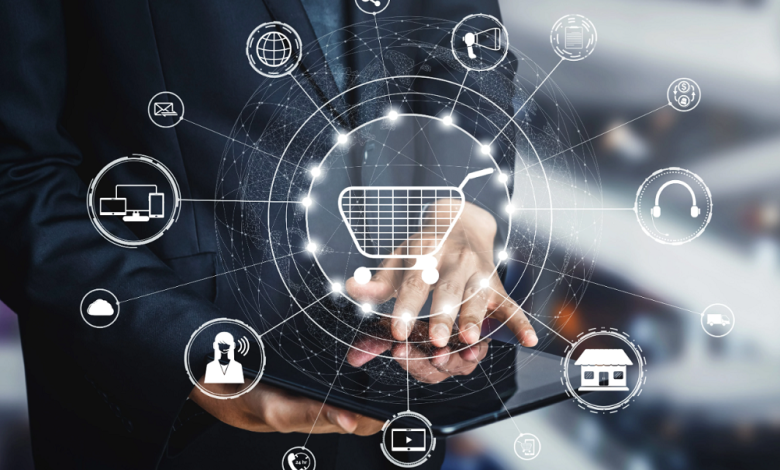
In the last few years, eCommerce sales have touched the sky, and people spend more time on online shopping sites than actual stores. Customers have become more intelligent, and they want unique shopping experiences. Businesses have been pushed to devise new methods and the latest technology to interact with customers. The internet of things (IoT) is an example of such technology impacting the eCommerce industry. How is IoT transforming the eCommerce landscape? What opportunities does it bring for eCommerce businesses? Read on to find out more on this.
7 Ways IoT Revolutionizing eCommerce Businesses for Betterment
1. Improving the Tracking & Logistics Process
Tracking the order fulfillment process efficiently is one of the biggest hurdles among eCommerce business owners. IoT resolves this issue and offers retailers better visibility on orders from the moment customers place them to when they reach their doorstep.
Now, retailers no longer have to worry about orders getting delayed or delivered at the wrong location and they can automatically track and locate them no matter where they are.
Besides, IoT technologies like GPS and RFID (Radio Frequency Identification) provide data like location, traffic status, weather, and personnel identities. All these things significantly improve logistics.
2. Automating the Inventory Management
ECommerce retailers need to have complete control over the product going out or coming into their inventories, and this can be a challenging task.
Tools like IoT sensors and RFID tags make inventory management a lot easier as eCommerce business owners don’t have to hire store managers to check merchandise and update its status physically. It also brings the chances of error in inventory management to a bare minimum.
Some IoT technologies like smart shelves and temperature-monitoring sensors ensure that you store sensitive and perishable items in optimal locations.
3. Offering Personalized Experiences to Consumers
Personalization is the key to surviving the current hyper-competitive eCommerce space. Selling products or services without it is like shooting an arrow in the dark and hoping it hits the bullseye. IoT can help you offer personalized experiences to your target customers by acquiring complete knowledge about your target customers.
If someone’s refrigerator is taking up too much energy, you can forward them the ads for energy-saving refrigerators. If you find them searching for products, you can start sending them similar options. Some insurance companies employ IoT-powered intelligent devices such as GPS and speed sensors for tracking discounts for vigilant drivers and fines for those who exceed acceptable speed limits.
4. Automating the Shopping Process
Imagine walking into a store, buying the product you need, and checking out without standing in a long queue. The idea sounds fascinating, and it has become a reality with IoT.
Amazon Go is an example. Customers walk in, buy, and walk out of these stores with the cost billed to their smartphones and it saves them hours of time and effort.
Going with this speed, we may even come across where predictive systems will know when customers will need shopping and pack the products prepared for them to pick up based on their shopping lists, and that will be a gamechanger.
5. Providing an Omnichannel Shopping Experience
The eCommerce space has moved way beyond the desktop and mobile phones. These days, eCommerce businesses offer omnichannel experiences to customers, and IoT plays a significant role in it. Acting as an intermediary between web developers and retailers offers them an unmatched shopping experience.
IoT is not only becoming a way to find products but also a medium to buy them. Voice search in eCommerce is a new norm as buyers heavily rely on intelligent assistants like Alexa for online shopping.
These days they don’t even bother to write lengthy reviews on shopping sites. Instead, the intelligent assistant just asks you if you want to recommend the product to others or not. I just gave five stars to a book I recently purchased using the same approach.
As IoT is also being used in homes, it will play an even more prominent role in eCommerce. We are not far from the day when our devices will recommend new products. It is already happening with smart refrigerators that detect the type of items, and keep track of their usage and expiry date – thus prompting you to buy the product before it expires or runs out of stock.
The shift from the traditional eCommerce model to headless eCommerce is one of the significant reasons IoT has risen to prominence in eCommerce. It just makes it easier to integrate the technology into such solutions.
So, we’re not far from the day when IoT will play a more prominent role in eCommerce.
The shift from the traditional eCommerce model to headless eCommerce is one of the significant reasons IoT has risen to prominence in eCommerce. It just makes it easier to integrate the technology into the solutions.
6. Offering Better Maintenance
IoT is redefining eCommerce maintenance. Businesses follow a reactive approach, i.e., customers face a problem and approach businesses with it. Then businesses try to solve it – leading to wastage of time and customer satisfaction. With IoT, they can handle issues proactively.
With IoT technologies, these businesses can now remotely access the products and predict their maintenance based on performance. As a result, they can alert the customer on time and repair/replace it in advance to avoid any issues in the future. TV and electronic gadget companies are doing this very well.
Besides, IoT also prevents these products from getting stolen or misplaced by constant alerts to users. There are features like “Find my iPhone.” which help you discover your device’s location and all this is possible only with IoT technology.
7. Maximizing the Income Potential
IoT helps businesses reimagine their operations. With the technology, they’re significantly reducing the time to market, improving the return on investment, and offering better services. As a result, they’re earning more revenue, minimizing inventory costs, and delivering customer experiences.
IoT facilitates higher revenue streams. eCommerce business owners are now thinking beyond selling products and offering ongoing services like performance analytics, predictive maintenance, and remote monitoring. It is altogether redefining the eCommerce space.
In a Nutshell
Technology plays a crucial role in the eCommerce industry and increased competition calls for innovation. Hence, leveraging IoT in your eCommerce business is the need of the hour. If you want to stay in the game, you must know it. Otherwise, you’ll vanish into oblivion. Best of luck!
What do you think of leveraging IoT in the eCommerce industry? Please share your thoughts in the comments below.



